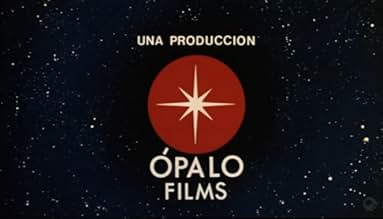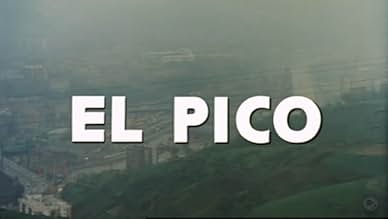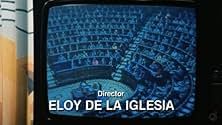IMDb RATING
6.8/10
1.3K
YOUR RATING
Paco, son of a conservative Civil Guard commander, and his best friend, Urko, son of a socialist politician, are heroin dealers and addicts. The two teens seem to be gripped by their addicti... Read allPaco, son of a conservative Civil Guard commander, and his best friend, Urko, son of a socialist politician, are heroin dealers and addicts. The two teens seem to be gripped by their addiction, but will tragedy be the only conclusion?Paco, son of a conservative Civil Guard commander, and his best friend, Urko, son of a socialist politician, are heroin dealers and addicts. The two teens seem to be gripped by their addiction, but will tragedy be the only conclusion?
- Director
- Writers
- Stars
José Luis Manzano
- Paco
- (as Jose Luis Manzano)
Andrea Albani
- Betty
- (as Lali Espinet)
Alfred Lucchetti
- Coronel
- (as Alfredo Luchetti)
Marta Pérez Ferrándiz
- Amiga de Betty
- (as Marta Perez)
Carme Contreras
- Asistenta
- (as Carmen Contreras)
Antonio Chamorro
- Guardia Civil
- (uncredited)
- Director
- Writers
- All cast & crew
- Production, box office & more at IMDbPro
Featured reviews
I know about the quinqui cinema and I have just watched "navajeros", "colegas", and then this one. In that order.
Regardless of the undeniably exploitative relationship that Eloy had with Jose Luis Manzano (due to both his position and age), I am only going to focus on his work. Having watched those three I can tell he fell in love with the subject and ran with it, but by this movie, he was also running out of energy and passion.
De la Iglesia obviously had more resources 3 years after "Navajeros", maybe because of that he felt that he needed to do more and drag this longer than necessary.
It feels like this movie should have ended with an open end by the time the guys are in the presence of the drug after being clean. Evaristo's disenchantment and doubts were already clear. The second part of the movie is more about the parents but we don't even get to know enough of Martin Aramendía, besides his affiliation.
I see that people talk about its "realistic portrayal". If we're talking about youth's problems and drug use, he had already done that before and far more effectively without a character explicitly telling us how he had changed throughout. I think some might have a more romantic perspective of the film due to its portrayal of ETA (for a second), the socialist party and the civil guard. I think the movie suffers due to its shifting focus. If it had focused mostly on fleshing out both parents and developing their relationship, I think we would have had a far superior movie. However, it is not just that, but the youth drama of any of his previous films plus many melodramatic and corny resources that made this the less enjoyable of the three films - the portrait of the dying mom was such a laughable scene.
Since he had already shown pubes, full frontals and gore before, this time De La Iglesia focused on the injections. I don't find the needles shocking but sad - I assume he let them get high on film. He would have done so but again, I don't want to talk about how these kids' realities and needs were exploitated by the admired director. Yet it seems I cannot.
Regardless of the undeniably exploitative relationship that Eloy had with Jose Luis Manzano (due to both his position and age), I am only going to focus on his work. Having watched those three I can tell he fell in love with the subject and ran with it, but by this movie, he was also running out of energy and passion.
De la Iglesia obviously had more resources 3 years after "Navajeros", maybe because of that he felt that he needed to do more and drag this longer than necessary.
It feels like this movie should have ended with an open end by the time the guys are in the presence of the drug after being clean. Evaristo's disenchantment and doubts were already clear. The second part of the movie is more about the parents but we don't even get to know enough of Martin Aramendía, besides his affiliation.
I see that people talk about its "realistic portrayal". If we're talking about youth's problems and drug use, he had already done that before and far more effectively without a character explicitly telling us how he had changed throughout. I think some might have a more romantic perspective of the film due to its portrayal of ETA (for a second), the socialist party and the civil guard. I think the movie suffers due to its shifting focus. If it had focused mostly on fleshing out both parents and developing their relationship, I think we would have had a far superior movie. However, it is not just that, but the youth drama of any of his previous films plus many melodramatic and corny resources that made this the less enjoyable of the three films - the portrait of the dying mom was such a laughable scene.
Since he had already shown pubes, full frontals and gore before, this time De La Iglesia focused on the injections. I don't find the needles shocking but sad - I assume he let them get high on film. He would have done so but again, I don't want to talk about how these kids' realities and needs were exploitated by the admired director. Yet it seems I cannot.
"El Pico" was the most successful of a swathe of films about drug addiction and juvenile delinquency that came out of Spain in the late '70s and early '80s. Despite its success it was also one of the last movies Eloy de la Iglesia made, as he succumbed to the same addiction as his characters.
"El Pico" (translated as "The Needle") centres around a young man in the Basque country in Bilbao, northern Spain. He is the son of a policeman, apparently a militaristic arm of the fascist government. His mother is dying of cancer.
The young man, named Paco, has a best friend, named Urko, whose father is a left wing politician who is agitating for Basque autonomy. Both boys are heroin addicts who start to deal drugs to pay for their habit. They visit an Argentine prostitute, and their dealer has a pregnant wife whose baby is soon born with heroin withdrawal. This leads to an extraordinary scene where the mother places the baby's pacifier in its mouth covered with heroin to stop it from crying.
The boys' addiction gets worse, and their lives predictably spiral out of control, leading to violence and death.
The movie is markedly less homoerotic than de la Iglesia's previous works, excepting some unnecessary and exploitative full frontal nudity. The last two de la Iglesia films I watched, "Cannibal Man" and "No One Heard the Scream", both featured eroticism only between the male lead and a superfluous handsome male character who opened the door to homosexuality, but de la Iglesia didn't take us through. Well, "El Pico" has an openly gay character - unlike those two movies - but also unlike them, this character isn't attractive at all; he resembles an anemic Marty Feldman with his huge eyes and angular face. He is, however, about the only compassionate figure in the movie.
It is hard to avoid comparisons with that German druggie movie, "Christiane F.", though the creator of the notorious video nasty "Cannibal Man" wasn't able to pull off a single scene which is anywhere near as harrowing as that film. For all its grit, it also doesn't feel as realistic; some of the twists and turns seem forced, and the ending still showcases de la Iglesia's habit of a final, unlikely development, here apparently trying to conflate drug use with being a policeman (?).
Lastly, I think the actors who play the two boys should have been switched. Urko, actually a minor character, is portrayed by a performer with more charisma and screen presence than the scruffy and sullen Paco. He also evinces far more sympathy from the audience; the camera loves him, and seeing him in Paco's role could have made "El Pico" a minor classic in league with "Christiane F.".
"El Pico" (translated as "The Needle") centres around a young man in the Basque country in Bilbao, northern Spain. He is the son of a policeman, apparently a militaristic arm of the fascist government. His mother is dying of cancer.
The young man, named Paco, has a best friend, named Urko, whose father is a left wing politician who is agitating for Basque autonomy. Both boys are heroin addicts who start to deal drugs to pay for their habit. They visit an Argentine prostitute, and their dealer has a pregnant wife whose baby is soon born with heroin withdrawal. This leads to an extraordinary scene where the mother places the baby's pacifier in its mouth covered with heroin to stop it from crying.
The boys' addiction gets worse, and their lives predictably spiral out of control, leading to violence and death.
The movie is markedly less homoerotic than de la Iglesia's previous works, excepting some unnecessary and exploitative full frontal nudity. The last two de la Iglesia films I watched, "Cannibal Man" and "No One Heard the Scream", both featured eroticism only between the male lead and a superfluous handsome male character who opened the door to homosexuality, but de la Iglesia didn't take us through. Well, "El Pico" has an openly gay character - unlike those two movies - but also unlike them, this character isn't attractive at all; he resembles an anemic Marty Feldman with his huge eyes and angular face. He is, however, about the only compassionate figure in the movie.
It is hard to avoid comparisons with that German druggie movie, "Christiane F.", though the creator of the notorious video nasty "Cannibal Man" wasn't able to pull off a single scene which is anywhere near as harrowing as that film. For all its grit, it also doesn't feel as realistic; some of the twists and turns seem forced, and the ending still showcases de la Iglesia's habit of a final, unlikely development, here apparently trying to conflate drug use with being a policeman (?).
Lastly, I think the actors who play the two boys should have been switched. Urko, actually a minor character, is portrayed by a performer with more charisma and screen presence than the scruffy and sullen Paco. He also evinces far more sympathy from the audience; the camera loves him, and seeing him in Paco's role could have made "El Pico" a minor classic in league with "Christiane F.".
I recently watched the Spanish film 🇪🇸 El Pico (1983) on Shudder. The storyline follows two best friends, the son of a politician and the son of a commander, as they delve into the world of drugs, specifically heroin, which becomes both their greatest high and a new source of business. Their descent into the heroin business leads their lives into a downward spiral.
Directed by Eloy de la Iglesia (Navajeros), the film stars José Luis Manzano (Navajeros), José Manuel Cervino (The Last Circus), Enrique San Francisco (Save the Zombies), and Carme Contreras (REC 3).
Set in Bilbao, a city my daughter and I adore, El Pico is an intriguing character-driven piece reminiscent of "Requiem for a Dream" in some aspects. The plot unfolds with smart twists and turns, some leading to better outcomes while others exacerbate the characters' situations. The acting is excellent, and the portrayal of addiction and rehab is compellingly realistic. The needle scenes are particularly intense and authentic. Additionally, there is unexpected nudity that adds to the film's shock value. The conclusion is marked by multiple twists and turns, leaving a sense of sadness and shock.
In conclusion, El Pico is a well-crafted depiction of drug addiction with clever narrative twists that make it worth watching. I would give it a score of 7.5/10 and strongly recommend it.
Directed by Eloy de la Iglesia (Navajeros), the film stars José Luis Manzano (Navajeros), José Manuel Cervino (The Last Circus), Enrique San Francisco (Save the Zombies), and Carme Contreras (REC 3).
Set in Bilbao, a city my daughter and I adore, El Pico is an intriguing character-driven piece reminiscent of "Requiem for a Dream" in some aspects. The plot unfolds with smart twists and turns, some leading to better outcomes while others exacerbate the characters' situations. The acting is excellent, and the portrayal of addiction and rehab is compellingly realistic. The needle scenes are particularly intense and authentic. Additionally, there is unexpected nudity that adds to the film's shock value. The conclusion is marked by multiple twists and turns, leaving a sense of sadness and shock.
In conclusion, El Pico is a well-crafted depiction of drug addiction with clever narrative twists that make it worth watching. I would give it a score of 7.5/10 and strongly recommend it.
This is one of the most realistic and shocking movies about drugs ever made, and one of the best I have ever seen. Set in Bilbao Spain in the early 80's we meet two teenagers Paco and Urko who deal drugs for living and hag out with Betty a foreign prostitute whom together they share sex and drugs mainly Heroin, Paco also hags out with a Homosexual local artist in secret. Well, the problem begins when Paco and Urko become addicted to Heroin, and not only that, Paco is the son of a sergeant of the Guardia Civil and Urko's dad is a leader of an important political party.
The film's atmosphere is cold and dark, the scenes of drug use sex and nudity are quit explicit, the acting and direction are good, probably one of Eloy De La Iglesias's best work.
Like Chrisnine F. it's based on a true story, the sequel is also not to be missed (EL PICO 2)
The film's atmosphere is cold and dark, the scenes of drug use sex and nudity are quit explicit, the acting and direction are good, probably one of Eloy De La Iglesias's best work.
Like Chrisnine F. it's based on a true story, the sequel is also not to be missed (EL PICO 2)
I am from Bilbao, Basque Country. I find that movie really a nice and very convincing tale of what was going on those years with GUARDIA CIVIL, Spanish police, the oppression against anything that was basque and the drugs that were used by the spanish police at that time, as a weapon against people. Against the free will of the basque politics.
Oppresion was shown on both sides of the society.
Young people was into heroin, that make them an instrument of the power, they were more interested in substance than in their freedom. And this is an important thing that is displayed into the movie, because that was what actually happened here. Of course, there was something else and it was the spanish goberment using violence and terrorism against the freedom of basque people. But that was going to be another story, told later on.
7 stars out of 10.
Oppresion was shown on both sides of the society.
Young people was into heroin, that make them an instrument of the power, they were more interested in substance than in their freedom. And this is an important thing that is displayed into the movie, because that was what actually happened here. Of course, there was something else and it was the spanish goberment using violence and terrorism against the freedom of basque people. But that was going to be another story, told later on.
7 stars out of 10.
Did you know
- TriviaThe name of the movie plays with two of the main concepts addressed in the movie: drugs (pico is a slang for heroin) and military forces (pico is the abbreviation of picoleto, a slang for the Civil Guard).
- ConnectionsFollowed by El pico 2 (1984)
- How long is El pico?Powered by Alexa
Details
- Release date
- Country of origin
- Official site
- Languages
- Also known as
- L'enfer de la drogue
- Filming locations
- Production company
- See more company credits at IMDbPro
- Runtime1 hour 50 minutes
- Sound mix
- Aspect ratio
- 1.66 : 1
Contribute to this page
Suggest an edit or add missing content

























